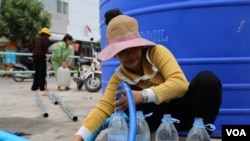The impact of water insecurity cannot be overstated. Water scarcity leads to lower food production, and can lead to economic stagnation, even a decline in the health of a population as sanitation and basic hygiene are difficult to maintain if water is scarce. Limited water resources can lead to regional disputes, even armed conflict.
Indeed, “Water can serve as a weapon of war, as we’ve seen in Ukraine where water infrastructure has been razed, leaving innocent civilians without essential services,” said USAID Deputy Administrator Isobel Coleman.
Working through USAID, the United States Government invests in global water security in some of the world’s most water-insecure communities.
“We have helped nearly 60 million people gain access to safe drinking water and 44 million people gain access to safe sanitation – more than half of whom were women and girls,” said Deputy Administrator Coleman.
“But as an Agency, we recognize that our investments must stretch further to deliver transformational and lasting changes. Two billion people still lack access to safe drinking water, with the greatest disparities held by poor and rural populations.”
The U.S. Global Water Strategy is the primary vehicle to set in motion the White House Global Water Security Action Plan, launched by the Biden Administration in June. Under the Global Water Strategy, the U.S. government works to advance health, prosperity, stability, and resilience in places they are needed the most.
Recently, the U.S. Government unveiled its 2022 to 2027 Global Water Strategy. For its part in this plan, USAID will work to reach 22 million additional people with safe drinking water, and another 22 million with sanitation, said Deputy Administrator Coleman.
The program targets people who have never before had access to water and sanitation. USAID will carry out its plan by strengthening the capacity of the institutions and providers responsible for delivering high-quality, equitable, climate-resilient services.
“We aim to strengthen 1,000 water security institutions; and mobilize one billion dollars in water and sanitation finance,” she said.
Such U.S. investments make it possible to grow food to feed the world, run businesses, and keep people healthy, said Deputy Administrator Coleman.
“They promote democracy, cooperation, and peace. Over the next five years, USAID looks forward to working in partnership to advance a water-secure world for all.”
Working through USAID, the United States Government invests in global water security in some of the world’s most water-insecure communities.






